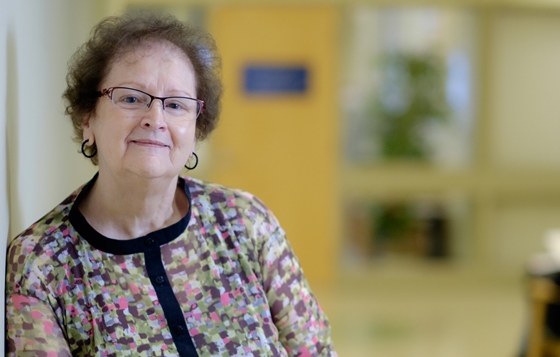
Janice remembers struggling for a while in her mid-40s, frustrated that the medications she was being prescribed were not helping her.
“I was horribly depressed,” she remembers. “I’ve been through quite a few medical things in my life, like cancer. But depression is the worst thing you have to go through. It’s just simply dreadful.”
At its worst, Janice felt like she wasn’t living, wasn’t taking care of herself properly and needed others to look after the children. Chores like dinner were an ordeal.
“I would go put a pot on the stove to boil the water for potatoes, and then go lie on the couch. Then I would get back up again, put the potatoes in, put the lid on, then go back, lie on the couch.”
During a bad episode one night, she was taken to her local hospital, where she was admitted. It was there she first met psychiatrist Dr. Hem Phaterpekar, who eventually suggested an alternative to medications – ECT, or electroconvulsive therapy.
“Instead of using medications to change neurochemistry in your brain,” explains Dr. Phaterpekar, “we are using a current to produce a seizure, which then produces chemistry changes in the brain, which then improves the patients’ depression significantly.”
Janice believes people have the wrong impression of ECT. “They don’t zap you with a whole bunch of electricity, like they did that poor guy in the movie One Flew Over the Cuckoo’s Nest,” she says. “I’m not saying those ECT treatments are a picnic. It’s something you have to go through in order to get better. You’ll try anything, you know.”
“It is one of the treatments of choice for major depression in seniors,” notes Dr. Phaterpekar, who has a specialty in geriatric psychiatry. “We don’t use it unless medications fail. And depressions which are associated with strokes or Parkinson’s or other medical conditions can respond very well with ECT treatment. ECT is also being used for schizoaffective disorders or patients with schizophrenia who are refractory to all kinds of medications.”
Janice had several ECT treatments and says they helped her. A few years later though, her depression returned and she underwent another course of ECT treatments. Since then, she has managed with medications and bi-monthly visits with Dr. Phaterpekar at Royal Columbian Hospital.
These days, Janice says she’s feeling good. “I am very happy. I like to read, and I like to listen to music, and I like my life right now.”
Her mental health isn’t something she discusses often with others, but Janice says those who know her most intimately have been supportive, especially her husband. “With my close friends, it’s just a part of my life,” says Janice.
She has been Dr. Phaterpekar’s patient for close to two decades now and feels grateful for the care she has received. “I don’t know what would have happened to me if I hadn’t had those ECT treatments,” she concludes. “I really don’t.”
